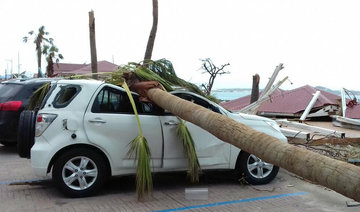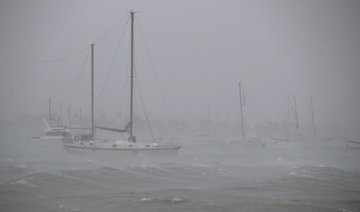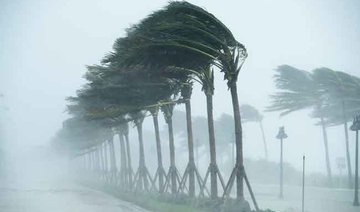PARIS: Hurricane Irma has pounded the Caribbean, leaving at least 25 people dead, destroying thousands of homes and triggering a mass evacuation in the US state of Florida.
After making landfall in Cuba’s Camaguey archipelago late Friday, Irma is now bearing down on Florida, where authorities have ordered 6.3 million people to evacuate.
Irma, previously a top-rated Category Five storm, weakened Saturday to Category Four and then to a Category Three, packing 125 mile-an-hour winds (205 kilometer per hour).
With near-hurricane force winds lashing the Florida Keys starting around 8:00 p.m. (0100 GMT), the Miami-based National Hurricane Center (NHC) warned that “Irma is forecast to restrengthen” as it approaches mainland Florida.
A second Category Four hurricane, Jose, followed part of Irma’s track, but spared storm-hit Caribbean islands of St. Martin and St. Barts, which had already suffered catastrophic damage.
Jose is expected to veer north and pose no threat to the United States.
The death toll stands at at least 25: 12 in the French island of St. Barts and the Dutch-French territory of St. Martin; six in British Caribbean islands; at least four in the US Virgin Islands; at least two in Puerto Rico; and one in Barbuda.
The International Red Cross says 1.2 million people have already been affected by Irma — a number that could rise to 26 million.
The bill for loss and damage could hit $120 billion (100 billion euros) in the United States and Caribbean, according to data modelling firm Enki Research.
Irma hit the tiny Caribbean island of Barbuda on Wednesday with winds up to 295 kph. The island suffered “absolute devastation,” with up to 30 percent of properties demolished, Prime Minister Gaston Browne said.
One person is known to have died on the island of 1,600 residents, apparently a child whose family was trying to get to safer ground.
Irma then slammed into the holiday islands of St. Barts and St. Martin, wielding monster winds and torrential rain.
St. Martin is divided between France and the Netherlands. France said 10 people had died on its side, while the Netherlands said the storm killed two on the Dutch side, called Sint Maarten.
On the Dutch side, 70 percent of the infrastructure has been destroyed.
Debris still clogs the streets, many homes are uninhabitable, communications are still down, tens of thousands are without food, water or power, and the authorities are struggling to prevent looting.
In the British archipelago of Anguilla, one man was crushed to death in a house collapse.
Five people have been killed in the British Virgin Islands, according to the local government.
Just east of Puerto Rico, it is home to roughly 28,000 people and includes British billionaire Richard Branson’s Necker Island.
At least four people have been killed in the US Virgin Islands, officials told AFP.
At least two people were killed in the US territory of Puerto Rico, and more than half of its three million residents were without power after rivers broke their banks in the center and north of the island.
Some 20,000 people were evacuated and more than 2,000 homes affected by floods in the Dominican Republic, the eastern part of the island of Hispaniola, which is also shared by Haiti.
Irma brought flooding and caused several injuries in Haiti, but passed further north than had been forecast, sparing the impoverished island the worst. A number of roads were washed out.
Irma made landfall on the island’s Camaguey Archipelago late Friday. Close to a million people have left their homes to stay with relatives or in shelters and the electricity supply cut as a precautionary measure.
Cuba had already evacuated 10,000 foreign tourists from beach resorts and raised its disaster alert level to maximum ahead of Irma’s arrival.
Irma is expected to strike the Florida Keys early Sunday, tracking along the peninsula’s western coast, which faces the Gulf of Mexico, rather than the more heavily populated Atlantic side, according to the US National Hurricane Center.
But the storm is so wide that the authorities have ordered 6.3 million people — more than quarter of Florida’s population — to evacuate and many residents have joined a mass exodus.
The US military is mobilizing thousands of troops and deploying several large ships to help with evacuations and humanitarian relief.
A state of emergency has been declared in Florida, Georgia, South Carolina, Virginia, Puerto Rico and the US Virgin Islands. Georgia ordered the evacuation of the city of Savannah and other coastal areas.
Hurricane Jose, after strengthening to Category 4 status, passed 135 kilometers (83 miles) north of St. Barts and 125 kilometers from Saint Martin.
France’s meteorological agency had issued its highest warning, saying Hurricane Jose could become a “dangerous event of exceptional intensity.”
But “thanks to a passage which was further away than anticipated, the effects on the territory were markedly less,” the meteorological agency said.
Another hurricane, Katia, made landfall in eastern Mexico late Friday killing two people, just as the country grappled with damage inflicted by its worst earthquake in a century.
What we know about hurricanes Irma and Jose: facts, figures, forecast
What we know about hurricanes Irma and Jose: facts, figures, forecast

How a Syrian refugee chef met Britain’s King Charles

- Alarnab, 48, said he had asked the king to come to the popular eatery when he met him at Buckingham Palace
LONDON: Pots clanged and oil sizzled inside the London kitchen of Syrian chef Imad Alarnab, as the former refugee who fled his country’s civil war recalled hosting King Charles III.
When the chef left his war-torn homeland in 2015, he never imagined that one day he would watch as cameras flashed and wide-eyed crowds greeted the monarch arriving at his Soho restaurant last year.
Alarnab, 48, said he had asked the king to come to the popular eatery when he met him at Buckingham Palace before an event honoring humanitarian work in 2023.
“I told him ‘I would love for you to visit our restaurant one day’ and he said: ‘I would love to’... I was over the Moon to be honest.”
The chef has come a long way since he arrived in London after an arduous journey from Damascus with virtually no money in his pocket.
Fearing for his life, he had escaped Syria after his family was uprooted again and again by fighting.
His culinary empire — restaurants, cafes, and juice bars peppered across the Syrian capital — had been destroyed by bombing in just six days in 2013.
Alarnab spent three months crisscrossing Europe in the back of lorries, aboard trains, on foot and even on a bicycle before he reached the UK.
“When I left, I left with nothing,” he told AFP, as waiters whirled past carrying steaming plates of traditional Syrian fare.
Starving and exhausted, he spent the last of his money on a train ticket to Doncaster where his sister lived.
“Love letter from Syria”
To make a living, Alarnab initially picked up any odd jobs, such as washing and selling cars, saving enough to bring his wife and three daughters over after seven months.
His love of cooking never left him though. In France, while he was sleeping on the steps of a church, Alarnab had often cooked for hundreds of other refugees.
“I always dreamed of going back to cooking,” he said.
So it wasn’t long before he found himself back in the kitchen, cooking up a storm across London with his sold-out supper clubs, bustling pop-up cafes, and crowded lunchtime falafel bars.
Alarnab’s friends gave him the initial boost for his first pop-up in 2017, and profits from his new catering business then covered the costs of later events.
He now runs two restaurants in the city — one in Soho’s buzzing Kingly Court and another nestled in a corner of the vibrant Somerset House arts center.
“I was looking for a city to love when I found London,” Alarnab said, adding it had offered him “space to innovate” and add his own modern twist to classic Syrian dishes.
Far from home, Alarnab said his word-of-mouth success had grown into a “love letter from Syria to the world” that needs no translation.
“You don’t really need to speak Arabic or Syrian to know that this is the best falafel ever,” he said, pointing to a row of colorful plates.
“There is hope”
For Alarnab, spices frying, dough rising and cheese melting inside a kitchen offered an unlikely escape from the real world.
“All my problems, I leave them outside the kitchen and walk in fresh.”
When he fled Syria, Alarnab thought going back to Damascus was forever off the table.
Yet he returned for the first time in October, almost a year to the day after longtime leader Bashar Assad was toppled in a lightning rebel offensive — ending almost 14 years of brutal civil war.
He walked the familiar streets of his old home, where his late mother taught him to cook many years ago.
“To return to Damascus and for her not to be there, that was extremely difficult.”
Torn between the two cities, Alarnab said he longed to one day rebuild his home in Damascus.
“I wish I could go back and live there. But at the same time, I feel like London is now a part of me. I don’t know if I could ever go back and just be in Syria,” he said.
Although Syrians still bear the scars of war, Alarnab said he had seen “hope in people’s eyes which was missing when I left in 2015.”
“The road ahead is still very long, and yes this is only the beginning — but there is hope.”














